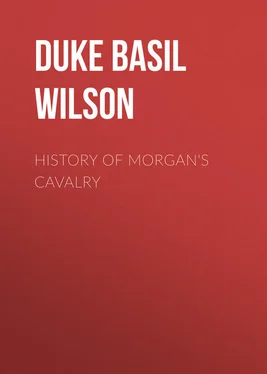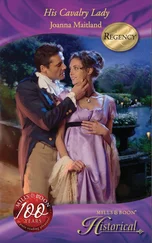Basil Duke - History of Morgan's Cavalry
Здесь есть возможность читать онлайн «Basil Duke - History of Morgan's Cavalry» — ознакомительный отрывок электронной книги совершенно бесплатно, а после прочтения отрывка купить полную версию. В некоторых случаях можно слушать аудио, скачать через торрент в формате fb2 и присутствует краткое содержание. Издательство: Иностранный паблик, Жанр: foreign_antique, foreign_prose, на английском языке. Описание произведения, (предисловие) а так же отзывы посетителей доступны на портале библиотеки ЛибКат.
- Название:History of Morgan's Cavalry
- Автор:
- Издательство:Иностранный паблик
- Жанр:
- Год:неизвестен
- ISBN:нет данных
- Рейтинг книги:3 / 5. Голосов: 1
-
Избранное:Добавить в избранное
- Отзывы:
-
Ваша оценка:
- 60
- 1
- 2
- 3
- 4
- 5
History of Morgan's Cavalry: краткое содержание, описание и аннотация
Предлагаем к чтению аннотацию, описание, краткое содержание или предисловие (зависит от того, что написал сам автор книги «History of Morgan's Cavalry»). Если вы не нашли необходимую информацию о книге — напишите в комментариях, мы постараемся отыскать её.
History of Morgan's Cavalry — читать онлайн ознакомительный отрывок
Ниже представлен текст книги, разбитый по страницам. Система сохранения места последней прочитанной страницы, позволяет с удобством читать онлайн бесплатно книгу «History of Morgan's Cavalry», без необходимости каждый раз заново искать на чём Вы остановились. Поставьте закладку, и сможете в любой момент перейти на страницу, на которой закончили чтение.
Интервал:
Закладка:
Cavalry was sent in pursuit, but was left far behind. Captain Morgan went straight across the country to the Murfreesboro' pike. As he gained it he encountered a small body of Federal cavalry, attacked and drove it into town. He lost only one man, but he was a capital soldier, Peter Atherton by name.
He got back to La Vergne about twelve at night. After the thorough and final evacuation of Murfreesboro', Captain Morgan withdrew to that place with his command. He almost directly afterward sent the bulk of it to the Shelbyville and Nashville road, with instructions to encamp about twenty miles from Nashville, and picket and scout the adjacent country, and all the neighboring roads. He retained with him at Murfreesboro', about forty of his own men, and some fifty of Colonel Wirt Adams' regiment of cavalry, under command of Lieutenant Colonel Wood, of that regiment. This officer was exceedingly fond of the sort of service which Morgan was performing, and had been with him constantly for ten or twelve days. He preferred to remain with and report to him, although his superior in rank, rather than accompany his own regiment on the retreat of the army, and see no active work.
A day or two after he had made this disposition of this command, Captain Morgan taking with him thirty-two of the men he had kept at Murfreesboro', penetrated by bridle paths and traces through the woods, to the immediate vicinity of the enemy's encampments at the Lunatic Asylum.
At this time, Mitchell's entire brigade was encamped there. Stationing his men in the thickets along the road, at various points, Captain Morgan went systematically to work to catch every thing that should come into sight. There was, of course, a great deal of passing to and from the headquarters of the commanding officers and between the various camps. No one anticipated danger there, and stragglers, couriers, escorts, and guards, went carelessly and unsuspectingly along, into the same bag. In the course of an hour or two eighty odd prisoners were taken. Colonel Wood went off with twenty-eight of them, and, by some oversight, sixty were started to Murfreesboro', later, guarded by only ten men. A number of wagons had been also captured and burned. The teams were used to mount the prisoners. One staff officer was captured and sent off with the large hatch of prisoners. Captain Morgan remained behind with one man, after he had sent off all the others. This sort of service always gave him great pleasure, and he was loth to give it up. As the number of passengers fell off, he rode down the road with his companion, dressed like himself in a blue overcoat, to a point where a guard of ten men were stationed under a Sergeant for some purpose. He placed himself between them and their guns, made his follower put his pistol to the head of the Sergeant and began to rate them for neglect of duty. He represented himself as a Federal officer of high rank and reminded them sternly and reproachfully that such careless guard as they were then keeping had enabled Morgan to play all of his tricks. They had been careless and were overwhelmed with just shame and mortification at his rebuke. He at length ordered them all under arrest, and taking the Sergeant's weapons from him and leaving the guns stacked – he could not have carried them off without entrusting them to the prisoners – he marched the whole party away. They were under the impression that they were going to Mitchell's headquarters, but he got them mounted and carried them to Murfreesboro'. In the meantime the smoke from the wagons which were burned within half a mile of Mitchell's headquarters, attracted attention and led to inquiry, and it was not long before what was going on was discovered. Troops were at once dispatched to put a stop to the mischief and beat off or follow the perpetrators. The Fourth Ohio got on the track of the party guarding the sixty prisoners, and, as its progress was necessarily slow, it was soon overtaken. Nothing could be done but release the prisoners and run for it, and the whole escort went off in rapid flight. One prisoner had, by a strange mistake, been allowed to retain a loaded gun. As one of the guard who had been in the extreme rear of the column dashed past this man, the latter fired and grazed his face. The other turned in his saddle, fired and shot his unexpected assailant dead. The pursuers had gotten close before they had been perceived, and they pressed the chase vigorously. Over fences and gulches, through fields and thickets, as hard as their horses could go, fled the one party and followed the other for ten miles. One of our men was killed, two or three wounded, and as many captured. Thirty-eight prisoners were secured by Morgan – twenty-eight brought off by Wood, and ten captured and escorted by himself. On the evening of the same day a party of eighteen men were dispatched from the camp on the Shelbyville road to push as close to Nashville as possible, and learn the position of the Federal troops in that quarter. I was myself in command of the party, and had an accurate knowledge of the points at which guards and pickets had been previously stationed. On arriving in the vicinity of these points – around which, without creating an alarm, it was desirable to pass, in order to get near to the encampments and observe them closely – they were found unoccupied. The party moved some three miles further down the road without coming upon an enemy, although a day or two before the picket posts had been thick in this quarter.
It was apparent that some plan for our benefit had caused this change, and unusual caution became necessary. I had hoped to find some officers quartered at the houses well in the rear of the reserve pickets, where they would believe themselves secure, and to capture them, but I now approached the houses, not with the expectation of making prisoners, but of getting information. None of the citizens in that neighborhood had ever seen any man in my party, and they would tell nothing, but their alarm at seeing us, and evident anxiety to get rid of us, showed plainly that they knew of the proximity of danger. At length, when in about six hundred yards of the Cross-roads near "Flat Rock," I think it is called, four miles from Nashville, and where it was confidently reported by our informants that McCook's division was encamped, I halted and secreted men and horses in the thick brush on the right hand side of the road, and, with the guide, went forward on foot about a quarter of a mile, until I suddenly heard the challenge of a picket. I judged from the words I caught that it was the officer of the day making his rounds. Soon a negro came down the road toward us, whom we caught and questioned. He answered very glibly, and evinced too little fear, not to excite suspicion that he came out to be captured with a made-up tale. He said that there were ten men on picket at the Cross-roads. As a large encampment was only a few hundred yards on the other side of this point, his story did not seem credible. However, we had at last found an enemy.
Leaving five men to take care of the horses, in the thicket where they were already concealed I carried the others through a wide meadow on the right of the road which we had traveled (the Shelbyville and Nashville pike) to the road which crossed it at "Flat Rock," striking the latter about two hundred yards from the point of intersection. I was convinced that the withdrawal of the pickets was part of a plan to entrap just such scouting parties as ours, and that a strong force was in ambush at the Cross-roads. There was little hope of accomplishing the objects of the expedition, but the trap could, at least, be sprung, and there was a chance of surprising the ambuscade. My men were armed with shot-guns and pistols, the proper weapons for such an affair. I ordered them to follow me in single-file in the direction of the enemy, instructing them to hold their fire until we were challenged, and to then discharge their weapons, and, without stopping to reload, make their way back to the horses. The moon had just gone down as we began to move slowly down the road. We made little noise, and were soon convinced by a chorus of coughing, which broke on our ears as we neared them, that a pretty good crowd was before us. When we had almost reached the point where the roads cross, a Sergeant, with five or six men at his back, sprang up, so near to us that I could have touched him by making another step, and ordered "halt," in a low voice, evidently taking us for friends. Our answer was a shot, and he fell dead. His comrades returned our fire, and at once a line of men rose from the fence corners on the opposite side of the road which we had just descended – we had passed them unseen in the darkness. Many of them must have been asleep until alarmed by the firing. The bulk of the force, however, was stationed upon the other road, and, as they sprang up at the sudden uproar, and aimed at the blaze of the guns, they endangered their own friends more than us. My men sank at once upon their knees, and the enemy firing wildly and high, did not touch one of them. They pointed their shot-guns low, and every flash was followed by a groan, and, by the quick vivid light, we could see the men we hit writhing on the ground. The curses and commands of the officers, shouts of the combatants, and yells of the wounded were mingled together. The breadth of the road, only, separated us, and the blaze from the guns met. When our weapons were emptied, we sprang over the fence and ran at top speed for our horses. A chain picket which had been posted on the left of the Shelbyville road, a short distance from it, rushed forward and opened upon us, and the enemy we had just bidden farewell redoubled his fire. When we regained the horses, we were nearly surrounded. Parties had come out from the woods behind us, as we passed down the road, and our retreat by the way we had come was blocked. Our signals to call in the laggards, as we prepared to leave, were answered from every direction by the enemy. But the woods befriended us, as they had often done before, and we escaped under its shelter. On that same night a similar adventure befell some Confederates (I think of Starne's command) on the Franklin pike, and some pickets were killed on the side of Nashville entirely opposite to that into which all of these roads (which have been mentioned) run. Of course every thing was attributed to Morgan, and the Federals were puzzled and uncertain, whether to believe him really ubiquitous , or the commander of two or three thousand men.
Читать дальшеИнтервал:
Закладка:
Похожие книги на «History of Morgan's Cavalry»
Представляем Вашему вниманию похожие книги на «History of Morgan's Cavalry» списком для выбора. Мы отобрали схожую по названию и смыслу литературу в надежде предоставить читателям больше вариантов отыскать новые, интересные, ещё непрочитанные произведения.
Обсуждение, отзывы о книге «History of Morgan's Cavalry» и просто собственные мнения читателей. Оставьте ваши комментарии, напишите, что Вы думаете о произведении, его смысле или главных героях. Укажите что конкретно понравилось, а что нет, и почему Вы так считаете.












